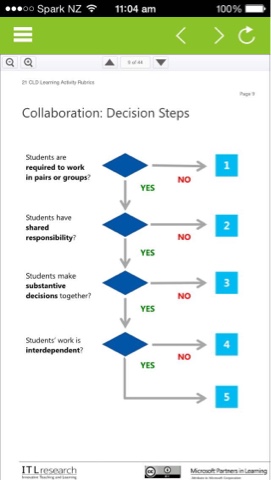This week we got to look at and play Scratch -https://scratch.mit.edu/ and Makey Maker http://www.makeymakey.com/
Makey Makey - makes an alternative circuit - students can be creative as they like with this - anything that is conductive is usable.
They can also combine this with Scratch to make all sorts of things! Creative use of a keyboard. Check out the website to see usage of these.
Group Task
Not actually sure how I'd use this as an application in my classes - probably for explaining narrative or creating atmosphere - we created a few moments of a spooky soundtrack atmosphere.....
The focus on this part of the session was on us experiencing collaboration under time pressure. This led onto the theory part of the session - linked to this week's key reading.
Discussion - why is collaboration such an impt skill now?
- we are no longer experts
- the Internet has levelled the playing field
- the network has connected the world
- we're social animals
- what skills are required in the workplace today - soft skills eg the ability to work in a group
- shared vested interest is a key - what is true collaboration - are you collaborating effectively
What are the key elements of collaboration ? Our group response :
Interesting discussions around the following questions -,But, do you let students choose the roles all the time? What if they choose the same thing all the time? What if they need to learn all the key skills? How do we manage the skills that we want them?
Below the rubric for assessing whether a task is truly collaborative, was discussed incline with the tasks we had experienced this morning - running our tasks 'through' this model makes us really think about the level of collaboration we think we are allowing.
The key aspect needs to be the purpose - a risk. In NCEA and assessment, we do not take this risk. There's a lag in the system. We have aspirational skills in the ITL skill sets, but rarely aim for them.
Nice analogy to pilots - we want them to learn by flying, ergo we want modern skill sets to be acquired by doing!
If we want students to have 21st century skills, then we'd have to assess in this way.
Research Informed Teaching
Research is critical to what we do as teachers - what is the relationship between research and practice?
Different levels of research findings - research should inform practice - if theory says this will work - context based research - adaptability is important - there is a complexity and context is important.
We need to question what - this is where teacher inquiry cones in.
Research presents hypotheses not facts. Research can never be definitive because it's exploratory.
we bring our own views towards research.
Avant grade music is sort of research music. You're glad someone's don't it but you don't want to listen to it - Brian Eno
Responses to research
- Research Led - based on the interests of teachers
- Research Orientated - you ask the meta questions - how we learn is impt
- Research Based - the students are doing the research
- Research Informed - we base our curriculum design on how it is informed by research
Of ten top educational theorists I knew 3 - Piaget, Dewey, Vygotsky
To what extent is our own practice informed by research? I guess for me it's Bishop and Berrymann.
The Dr Michael Fox video http://youtu.be/RcxW6nrWwtc for a funny look at the 'value' of research.
There is a tension as a teacher / researcher - and ethical issues. You are part of the situation - you are a participant researcher - the focus is on qualitative research. The focus is on the how and why - the human experience - but we need a mix of both - best evidence synthesis.
In my contexts - what are the benefits of research?
- data driven and evidence based
- support and back up what's going on - community by in
- enable change
- better outcomes for students
- edict from on high
We cannot be ignorant of the research, but at the same time cannot panic about it - it never has a definitive answer and is often contradictory.
Why do we need the literature? Because despite its flaws, it's better than anecdote and hearsay!!!




No comments:
Post a Comment